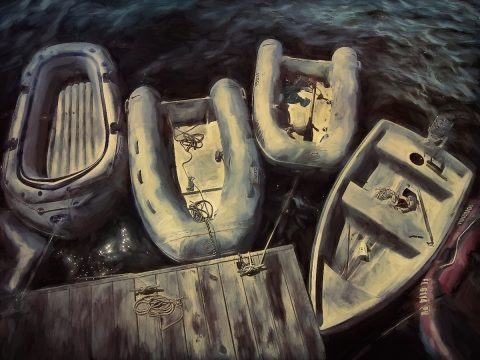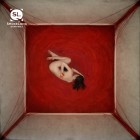This story is located in as dire a moment as possible: the contemplation of one’s world ending, both literally with the threatened plane and figuratively with a crisis in the narrator’s personal world. Could you talk a little about the dual trajectories—how you chose to connect the airplane situation and the emotional quandary?
I love flipping emotional clichés. I had in mind to write that moment, the trope of a near-death confession, the desire to unburden yourself before you go to peace. Deep, intense friendship—the kind that lasts a lifetime, for which the word “friendship” doesn’t really cut it—means complicity, means sitting in witness with people as they do awful things. That you carry that knowledge around with you, I could see that as a kind of sin. Do you need to confess that? And what about sins of omission? What about sins that only feel like sins in a moment of finality? Of course, it is impossible to know when that moment is, what’s going to feel like the gaping chasm of your life. Can it really be the end of the world if you don’t have pants on? Yet it does feel like the end of the world when someone withholds a love confession. Maybe that confusion is really what we need to unburden ourselves of, right before we see the light.
The story is one long paragraph; the present action takes place in what might be mere moments, with the briefest interjections that weave in the story line of the best friend and his wife. It could almost be a prose poem. What dictates the shape and length of your stories, and how do you decide what can be contained and what is best left out?
This story originally started off a prompt by a good writer friend, which included the phrase, “Take a look at yourself.” I love the rhythm of colloquial language, and that line, which became the title of the story and its mantra, engaged my language center immediately: It’s a command, it feels almost iambic, it can be broken down and rearranged. I write for breathlessness, probably because it’s how I talk, breathlessly, with a lot of hand gestures and asides for punctuation. Because flash so often depicts one present moment, I love writing the unspoken mess of innuendos, raised eyebrows, meaningful looks, and memories behind an action. We don’t see the fight in the car on the way to Thanksgiving, but we’re hyper-aware of its aftershocks when we’re in the kitchen, wielding knives. Juxtaposing seemingly disparate elements and making them jive together emotionally through form is what gives me a lot of energy, writing-wise.
Tell us about yourself and flying—routines, preferences, fears, annoying seatmates. Have you ever had any scary flying moments? What do you see when you look out the window of the plane?
Here’s something weird: Every time I’m on a plane and it takes off, I think, this could be it. It’s a macabre thought, but truthfully I often feel serene. The plane takes off in that sort of orgasmic rush, faster and faster on the runway, and then lift-off, and your stomach sinks and rises at the same time, and you can feel the other passengers grip their armrests or close their eyes, and it seems like everybody is praying. Sensory overload, real fever pitch. Then the plane levels out, and life returns to normal. If I had any actual scary flying moments, I’d probably not feel so poetic. Usually I watch the clouds and think about how weird it is that we’re, you know, flying.
Your author page shows that you frequently write both fiction and nonfiction. In what ways are you drawn to each of these genres?
I always feel like a bit of a fraud because I so freely borrow from real life in my fiction, and then in nonfiction I feel this urge to consider all sorts of alternate selves and imaginary spaces, so it’s hard for me to say why I write one or the other. Fiction gives me space to figure out how the flotsam and jetsam from life might add up to bigger emotional truths: the offhand comments, awkward events, errors of speech, etc. By contrast, perhaps my nonfiction feels more expansive. Instead of trying to collect and collate and summarize, I start with a central idea and shatter it into fragments—see how big the umbrella can get.
Care to make any confessions?
The very first time I shoplifted, I stuck a piece of caramel candy in my sock. As soon as I got home I ran to the basement and stuffed it into my mouth and had a panic attack. It was one of those cubed caramels that you get in bulk at Halloween and the shape of it was so clear and obvious inside my sock, so I have no idea how I wasn’t caught. I still wonder about that.



 The SmokeLong Grand Micro Contest (The Mikey) is now an annual competition celebrating and compensating the best micro fiction and nonfiction online.
The SmokeLong Grand Micro Contest (The Mikey) is now an annual competition celebrating and compensating the best micro fiction and nonfiction online.